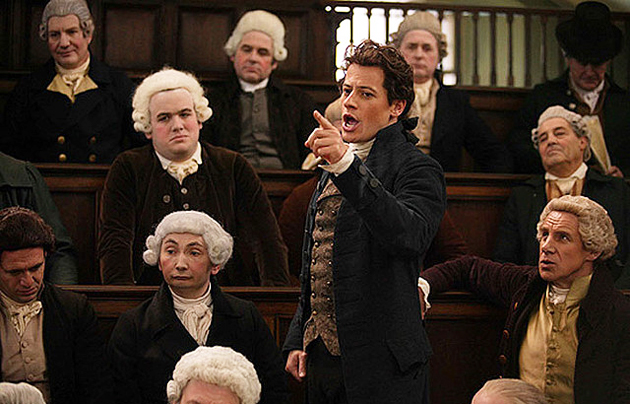The movie Amazing Grace was a biography of the life and work of an obscure British politician who lived 200 years ago. Why was William Wilberforce's story so compelling to the modern viewer?
 Picture of the film
Picture of the film
The movie Amazing Grace was a biography of the life and work of an obscure British politician who lived 200 years ago. Why was William Wilberforce’s story so compelling to the modern viewer?
Wilberforce’s life is a powerful and hopeful vision of how one person can change the world. Wilberforce was the British member of Parliament who led the movement against the legitimacy and legality of slavery in the British Empire. He persuasively presented evidence of the horrors of slavery, pricking the nation’s conscience and advocating for the abolition of first the slave trade and eventually of slavery altogether in the British Empire.
ELIMINATION OF THE SLAVE TRADE
After sixteen years of effort, when the House of Parliament met to eliminate the slave trade, the slow political change came to a climax in a rush. The members of Parliament became aware that the last opposition to Wilberforce was falling away. As his motion came up for a vote, the members began to affirm Wilberforce’s character and perseverance as he had courageously fought this enormous social evil. Biographer John Pollock summarizes the British Solicitor-General’s speech at Parliament that night in these words:
"He contrasted (Napoleon) Bonaparte and Wilberforce each retiring for their night’s rest; Bonaparte in pomp and power at the summit of ambition, yet with sleep tormented by the blood he had spilt, and the oppressions he had committed. And Wilberforce, returning after the vote that night 'into the bosom of his happy and delighted family', to lie down in pure and perfect felicity, conscious of 'having preserved so many millions of his fellow creatures.'
The House rose almost to a man and turned towards Wilberforce in a burst of Parliamentary cheers. Suddenly, above the roar of 'hear, hear,' and quite out of order, three hurrahs echoed and echoed while he sat, head bowed, tears streaming down his face."1
That night, the House of Parliament voted against the slave trade 283 to 16.
This is one of the highlights of Wilberforce’s story. Many know the triumph of his accomplishment and have traced the origin of the modern elimination of slavery to Wilberforce. But what I find most fascinating is the beginning of Wilberforce’s story.
THE YOUNG WILLIAM WILBERFORCE
William Wilberforce, the son of merchant princes, grew up in privileged surroundings hostile to Christianity. In the British upper class, any genuine Christian was called a “methodist” or “evangelical” or “serious” and was shunned by higher society. Nonetheless once when staying as a young boy with his Evangelical Aunt and Uncle, he was exposed to the pastor and former slaver trader John Newton. (Newton would one day become famous as the writer of the Hymn “Amazing Grace”). Young Wilberforce was fascinated by Newton’s stories and sermons. His mother, hearing of this influence, was fearful that “he might be ‘turning Methodist’”2 and came to London to rescue him.
The rescue took. Biographer John Pollock reports that “the Wilberforce family began to scrub William’s soul clear of”3 the Evangelical influence of his aunt and uncle. His family took him to plays, parties and the full range of upper class amusements. Wilberforce had little contact with vibrant Christianity for the next 15 some years. He grew into a charming young man and had many friends. He had exposure to high society as the son of a rich merchant family and eventually went to Cambridge University.
While at Cambridge he was not a disciplined student, but majored in recreation and amusements. One fellow student, Thomas Gisborne, who won the Chancellor’s Medal in classics and lived next door, commented that Wilberforce spent,
"much of his time in visiting, and when he returned late in the evening to his rooms he would summon me to join him ... He was so winning and amusing that I often sat up half the night with him, much to the detriment of my attendance at lectures the next day."4
His teachers allowed him and other rich young men “to treat a university as a place to acquire a little civilization.”5 Wilberforce himself often looked back on his Cambridge years with disappointment that his tutor “never urged me to attend lectures and I never did.”6
After graduating with a degree in classics, Wilberforce aspired to a political career and was voted into parliament as a young man of only 21. Wilberforce was invited to join several upper crust social clubs during his first few years in London. He was accepted in these blue blood circles because he was witty, rich, amusing, and he could sing like a bird. The Prince of Wales told the Duchess of Devonshire that he would attend any social gathering if Wilberforce would be there to sing.7
Furthermore, Wilberforce had an amazing gift for politics. He was able to deliver compelling speeches, genuinely befriend others and build effective strategies. His best friend, William Pitt, became the Prime Minister at the grand old age of 23. Wilberforce was his confidant, co-worker and strategist for their common agenda.
 London Parliament, Isidre65 (Flickr, CC)
London Parliament, Isidre65 (Flickr, CC)Wilberforce was successful, joyful and content with his life. Yet when he was 25 years old, Wilberforce became a Christian and his life was never the same. Why did he do this? What caused this happy pagan to become a Christian? Further, what produced this commitment to eliminate slavery and to persevere in his fight for justice?
WHAT CAUSED THE HAPPY PAGAN TO FOLLOW JESUS?
Wilberforce’s adult exposure to historic Christianity began when he wanted to take his mother and sister on a vacation to the Italian Riviera, but he lacked a traveling companion for himself. One friend turned him down and he impulsively asked a new acquaintance, Isaac Milner, a young professor at Cambridge University. Milner, Wilberforce recalls, was “very much a man of the world in his manners” and “was lively and dashing in his conversations.”9 But Wilberforce did not realize that that Milner was also an Evangelical. If he had known Milner’s convictions, Wilberforce would never have invited him.
 Manarola, NiJ0 (Flickr, CC)
Manarola, NiJ0 (Flickr, CC)Milner and Wilberforce soon found that they had rather severe disagreements in the area of Christianity. Wilberforce, with his fashionable Unitarian views, sought to wittily and flippantly attack Milner’s historic Christianity. Milner responded, “Wilberforce, I don’t pretend to be a match for you in this sort of running fire. But if you really wish to discuss these topics in a serious and argumentative manner I shall be most happy to enter on them with you.”11
They were to spend the next few months together. During this time, they continued a running discussion concerning Christianity’s truthfulness. The result? By the time they reached London again, Pollock reports, “Wilberforce had reached intellectual assent to the Biblical view of man, God and Christ.”12 They had read and discussed the Greek New Testament and Wilberforce had raised “my various doubts, objections and difficulties.”13 These questions were answered by Milner. Wilberforce, looking back, acknowledged, “I now fully believed the Gospel and was persuaded that if I died at any time I should perish everlastingly.”14
Over the course of the following year Wilberforce’s intellectual convictions began penetrating to his heart. He began to be aware of his failings of character and entered into a process of conversion or what Wilberforce came to call the “great change.”15 He became very convicted about his sin. “I was filled with sorrow. I am sure that no human creature could suffer more than I did for some months.”16 Like the pain of childbirth, his spiritual conviction would eventually lead to great joy, but for a time he felt the excruciating pain of realizing his own selfishness. He began praying and attending church regularly as he sought spiritual resolution. Pollock reports,
"For Wilberforce, the crisis hung on the dilemma that if he became a Christian he must be fully at God’s disposal; and then he would become the odd man out in his circle, might lose his popularity and friends, perhaps must abandon political ambition. He had to choose between Christ and the world. He wanted both."17
Wilberforce began to wonder if committing to become a Christian would require leaving his work as a politician.
In seeking resolution, he sought out his old spiritual inspiration John Newton and asked his advice. Newton advised him to not withdraw from the world but to take up his vocation of a politician as a faithful believer and reflect God’s character in the world. “It is hoped and believed that the Lord has raised you up for the good of His church and for the good of the nation.”18
Wilberforce decided to live for God. Pollock summarized “The awareness of being redeemed, bought at great price from the slavery of sin, became stronger than the sense of guilt.”19 Soon after on a walk in the countryside, Wilberforce reports that he was “comforted” and began to pray and give thanks as he felt all of nature “to be swelling the song of praise and thanksgiving.”20
Over the next several months, Wilberforce’s family and friends began to see him change. Pollock reports, “His mother had heard alarming rumors that he had turned melancholy mad”21 since he did not go to the theater any longer. Yet, when she spent time with him, she was shocked by “his cheerfulness, his consideration and the absence of quick temper.” She later commented, “If this is madness, I hope that he will bite us all.”22
THE IMPORTANCE OF APOLOGETICS
What do we discover here? At the root of the massive social movement to eliminate slavery was apologetics – a Christian persuasively explaining why Christianity is true. An apologist led Wilberforce to Christ.
Wilberforce then became an apologist, persuading his friends and acquaintances that the gospel was really true and that they should put their faith in Jesus. It was the greatest gift he could give them. He didn’t love them in order to share the gospel message. He loved them and thus felt compelled to explain to his friends the word of truth about Jesus. Pollock records,
"Wilberforce set out to bring his friends to Christ. He would agonize about them in his diary and his prayers, he would think out phrases or subjects (‘launchers’, he termed them) which might turn the talk to religion, whether at table or tête-à-tête." 23
Soon he had a loose circle of disciples and acquaintances who were drawn into a relationship with God.
Wilberforce was also committed to clarifying the deep gulf between the New Testament and the tepid Christianity of his day and so wrote A Practical View,24 which was a brilliant cultural apologetic. It became a best seller and was published in 5 other languages.25 In it he proclaimed that the gospel was not an eternal insurance program, but God’s means to save and transform individuals who then are called to reflect his character into the culture. He argued that “I wish to have impressed on the hearts and consciences of all: that all men must be regenerated by the grace of God before they are fit to be inhabitants of heaven, before they are possessed of that holiness without which no man shall see the Lord.”26
Further, the conviction of the truthfulness of the gospel was the springboard of his calling to reflect the character of God into the culture. If Christianity was true, then slavery was wrong and should be stopped. How can we reflect the character of God into our culture? By persuasively communicating the relevance and truthfulness of Christian convictions in every realm of life. We must hold to and reflect our biblical worldview convictions, such as justice and the dignity of man, into our professions as politicians, medical professionals, and teachers.
The point of my discussion of Wilberforce is the vital importance of apologetics in the health and life of the church. A very strong argument can be made that the health of the church throughout history is determined significantly by whether the church has the healthy tap root of conviction that Christianity is true and is therefore eager to persuade others of this truth.
We certainly see this reality with Wilberforce. Wilberforce came to faith through the gift of an apologist. He then worked for nearly the next half century seeking to persuasively convince people of the truth of Christianity and to eliminate slavery and reform society. Without apologetics, Wilberforce would not have been fighting against the evil of slavery. When we lose the ability to know that the gospel is true, we lose the very core of our faith. And without this conviction, eventually our faith will wither and blow away.
Come back next week as we try to understand what apologetics really is and how we can become more effective at persuasively communicating the gospel today.
1 John Pollock, Wilberforce (England: Lion Publishing, 1986), 211, 308. It should be clarified that the scene in 1807 depicted by Pollock was at the elimination of the slave trade in the British Empire. The outlawing of slavery itself took an additional 26 years. Wilberforce heard the news on July 26, 1833 that the abolition of slavery itself had passed the third reading in the House and was “excelled in the success which we obtained … as much as the youngest partisan could have done.” Three days later, his work finished, he died peacefully in the night.
2 Pollock, Wilberforce, p. 5.
3 Pollock, Wilberforce, p. 6.
4 Pollock, Wilberforce, p. 8.
5Pollock, Wilberforce, p. 7.
6 Pollock, Wilberforce, p. 7. Wilberforce complained later in life,“when you think that all those without exception who ought to have been urging me on to diligence and exertion were leading me into scenes of idleness and dissipation you must see what I mean. I’m sure that as much pains were taken to make me idle as were ever taken to make any one else studious.” (Pollock, Wilberforce, p.9).
7 Pollock, Wilberforce, p.15.
8 Isidre65. “LONDON-PARLIAMENT.” August 10, 2014. Flickr.
9Pollock, Wilberforce, p.32.
10 NiJ0. “Manarola, Cinque Terre.” June 7, 2014. Flickr.
11 Pollock, Wilberforce, p.34.
12 Pollock, Wilberforce, p. 35.
13 Pollock, Wilberforce, p. 36.
14 Pollock, Wilberforce, p. 36.
15 Pollock, Wilberforce, p. 37.
16 Pollock, Wilberforce, p. 37.
17 Pollock, Wilberforce, p. 37.
18 Pollock, Wilberforce, p. 38.
19 Pollock, Wilberforce, p. 39.
20 Pollock, Wilberforce, p. 39.
21 Pollock, Wilberforce, p. 43.
22 Pollock, Wilberforce, p. 43.
23 Pollock, Wilberforce, p. 66-7.
24 A PRACTICAL VIEW of the Prevailing Religious system of Professed Christians, in the Higher and Middle Classes in this Country, contrasted with Real Christianity by William Wilberforce, Esq., Member of Parliament for the County of York. (April 12, 1797), in Pollock, Wilberforce, p. 146
25 Pollock, Wilberforce, p. 146-7.
26 Pollock, Wilberforce, p. 150.
Greg Pritchard earned his MA from Trinity School of Divinity before continuing on to finish his PhD at Northwestern University. The intersection of theology, history, philosophy and sociology is Greg’s primary focus both in teaching and writing. He has taught graduate-level courses on apologetics, theology, history, leadership, the New Testament, ethics, and Christian Thought at American, European, and Asian institutions of higher learning. His book, Willow Creek Seeker Services, has been published in four languages. In addition, Greg has worked as the COO at a Chicago investment firm. Currently, he serves as the President of the Forum of Christian Leaders and as the Director of the European Leadership Forum.
The Forum of Christian Leaders (FOCL) is the sponsor of the European Leadership Forum (ELF), which seeks to unite, mentor, and resource European evangelical leaders to renew the biblical church and re-evangelise Europe. This happens first at the ELF's annual meeting that occurs each May in Poland. In addition to the ELF, FOCL is host to an online media library and learning community for evangelical Christians. Learn more at foclonline.org and euroleadership.org; or join us on Twitter @FOCLonline and Facebook Forum of Christian Leaders.

Las opiniones vertidas por nuestros colaboradores se realizan a nivel personal, pudiendo coincidir o no con la postura de la dirección de Protestante Digital.
Si quieres comentar o